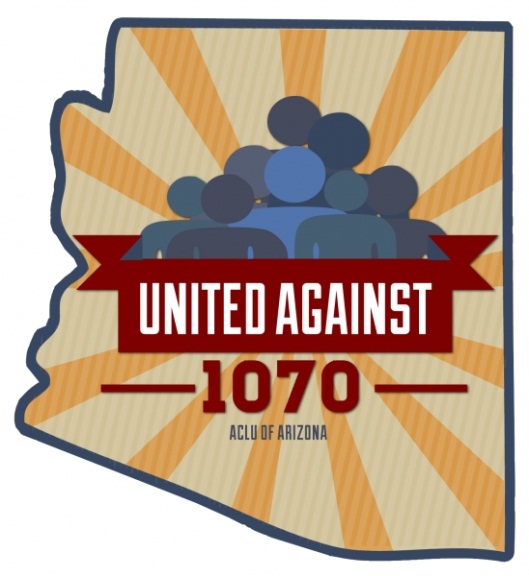Office Closure: December 19 - January 4
The ACLU of Arizona is closed for the holidays! We will resume normal operations beginning January 5.


United Against SB 1070
Last updated on May 26, 2017
United Against SB 1070
Arizona’s “Show Me Your Papers” Law, SB 1070
Shortly after SB 1070 was signed by then-Gov. Jan Brewer in 2010, the ACLU and the U.S. Department of Justice filed lawsuits challenging the law, charging that it is unconstitutional and encourages racial profiling. Over the years, courts have struck down many parts of the law.
These are among the provisions that courts have rendered unenforceable:
- Section 3: A.R.S. § 13-1509: This provision made a person’s failure to comply with federal noncitizen-registration requirements a state misdemeanor. It was struck down because federal law preempts it.
- Section 5: A.R.S. § 13-2928(A) and (B) day labor prohibitions: These provisions made it unlawful for occupants of vehicles stopped on roadways and impeding traffic from trying to hire people for work at another location and for individuals to enter such vehicles in order to be hired. It was struck down on First Amendment grounds as an unconstitutional limit on freedom of speech.
- Section 5: A.R.S. § 13-2928(C): This provision made it a misdemeanor for unauthorized noncitizens to seek or engage in work in Arizona. This provision was struck down because it is preempted by federal law.
- Section 6: A.R.S. § 13-3883(A)(5): This provision authorized officers to arrest a person without a warrant if the officer had probable cause to believe the person committed any public offense that would make the person removable from U.S
A complete list of the enjoined and limited provisions of SB 1070 is available here.
The U.S. Supreme Court did not strike down the most hotly disputed part of Arizona’s anti-immigrant law, Section 2(B). This “show me your papers” provision requires police to make a reasonable attempt, when practicable, to determine the immigration status of anyone who is lawfully stopped when the officer has “reasonable suspicion” the person stopped is not in the U.S. with proper documentation.
However, in September 2016, Arizona Attorney General Mark Brnovich provided an opinion providing law enforcement agencies across the state with important guidance about how this provision should be enforced. Important components of the opinion include the following statements:
- “Officers shall not prolong a stop or detention for an immigration inquiry to request or obtain verification of immigration status, or prolong a criminal investigation or inquiry in order to accommodate or complete immigration-related tasks.”
- “Officers shall not contact, stop, detain, or arrest an individual based on race, color, or national origin,” unless in accordance with a “timely, reliable, and geographically relevant” specific suspect description or “otherwise authorized by law.”
- Where “an officer has reasonable suspicion that an individual is unlawfully present in the United States,” the officer may not prolong a stop or detention in order to contact ICE/CBP.
- An officer may exercise discretion not to investigate immigration status where “not practicable” or where such investigation may hinder a different investigation.
- “[P]robable cause to believe that an individual has committed a civil immigration violation” does not give an officer authority to arrest that individual. An officer “shall not detain” such an individual for any length of time beyond the time necessary to complete the state-law basis for the stop, where the officer is not acting under § 287(g) authority.
- “Officers shall not arrest an individual simply because the individual lacks proper documentation.”
Despite these victories to void and limit major portions of SB 1070, the ACLU of Arizona knows that this law has invited racial and ethnic profiling of Latinos, Native Americans, Asian Americans, and others presumed to be “foreign” based on how they look or sound. This discriminatory law authorized law enforcement to demand papers proving citizenship or immigration status from anyone they stop and suspect of being in the country unlawfully. Although it has been seven years since SB 1070 began terrorizing communities throughout Arizona, many are still reeling from the aftermath.
The ACLU’s travel advisory related to SB 1070, issued in 2010, has not been lifted. We still continue to advise people to understand their rights and the risks they face when they enter Arizona because of the state’s “show me your papers” law. People need to be aware that because of SB 1070 every interaction with law enforcement can become a citizenship interrogation and potentially an illegal arrest. We still believe this law is unconstitutional and we are documenting its abuses, like racial profiling and prolonged traffic stops, in order to have it struck down or repealed. Only then will we lift our advisory. If you believe you have been a victim of SB 1070, please contact us.
Related Issues
Related Content

- Immigrants' Rights

